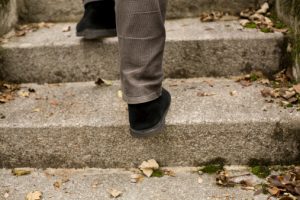
Lead investigator, Jason Steffener, said, “Education and physical activity affect the difference between a physiological prediction of age and chronological age, and that people can actively do something to help their brains stay young. This is encouraging because it demonstrates that a simple thing like climbing stairs has great potential as an intervention tool to promote brain health.”
The researchers used MRI scans to assess physical brain health of 331 healthy adults. Individuals who could climb a flight of stairs and who had higher educations had better brain health, compared to those who could not climb stairs or had lower education.
Specifically, the individual’s brain age was one year younger with every year of education, and for every flight of stairs the individual climbed each day, the physical brain was half a year younger.
Steffener concluded, “In comparison to many other forms of physical activity, taking the stairs is something most older adults can and already do at least once a day, unlike vigorous forms of physical activity.”